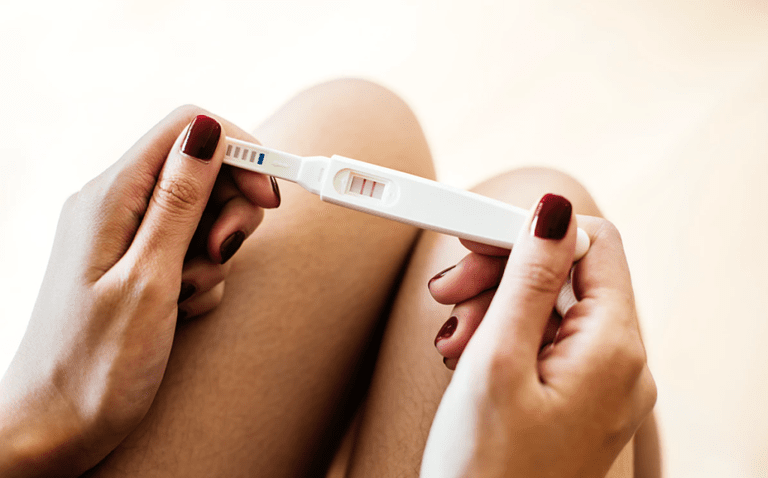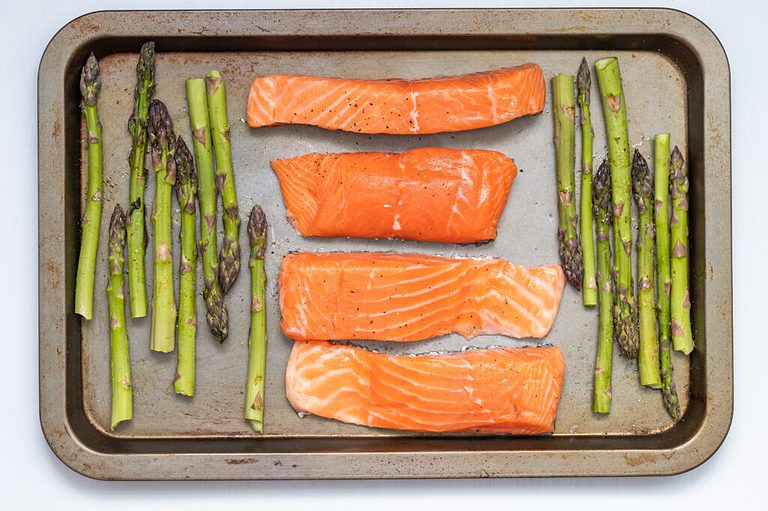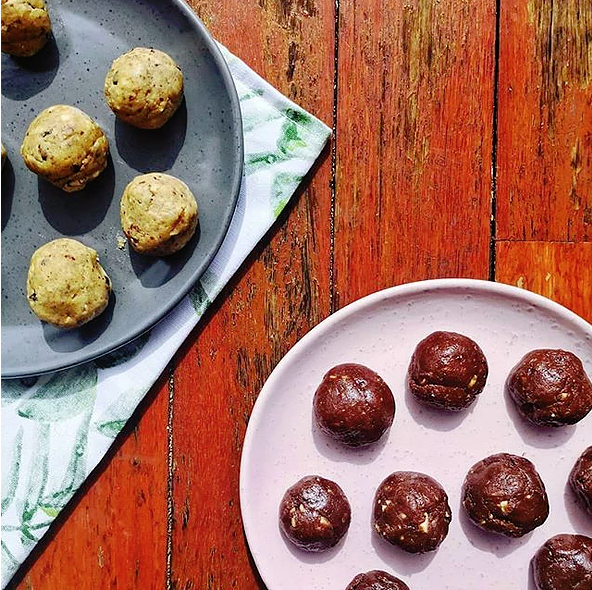Wondering what is the best diet for managing the symptoms of adenomyosis? This is becoming an increasingly common topic amongst our community over on Instagram (@endo.dietitian) as we continue to learn more about adenomyosis, and with that, what foods to eat and what to avoid. Although there is a huge lack of research on the topic (if you thought endometriosis and diet research was lacking, wait till you see adenomyosis and diet!), I’m sure Dr. Google has given you the impression that the only way to settle the symptoms is by going gluten-free, dairy-free, sugar-free, alcohol-free and basically fun-free.
Well, good news, this article is going to take a slightly different approach when it comes to diet and adenomyosis, after all, as qualified & expert dietitians, we want to be aiming for a sustainable lifestyle approach that gives you maximum flexibility with as few symptoms as possible when it comes to a long-term dietary approach.
As always, let’s look at the evidence and research to figure out what foods are best to support you (or a loved one) when it comes to designing the best diet for adenomyosis.
Firstly, what is adenomyosis?
Understandably, you might be wondering what adenomyosis actually is. The first thing worth noting is a common misconception, it is thought that Adenomyosis is most common in mature women approaching menopause, however, it can absolutely occur at any point from adolescence! Adenomyosis might affect anywhere from 20% – 65% of females in their life (Cleveland Clinic, 2022). It is often thought of as the quiet relative of endometriosis, with over 70% of those with adenomyosis also having a diagnosis of endometriosis.
Adenomyosis is a condition where endometrial glands found in the endometrial lining and tissue grows into the middle layer (AKA – in the muscle layer, known as the myometrium) of the uterus (Vannuccini & Pertraglia, 2019). Much like endometriosis, it is also an estrogen-linked disease.
Adenomyosis often presents with symptoms of:
- Heavy menstrual bleeding
- Pain with sexual intercourse
- Pelvic pain which may radiate down the legs
However, much like endometriosis, many people can be asymptomatic with adenomyosis (Struble et al., 2016).
Adenomyosis is an inflammatory condition that results in changes in the immune function within the uterus. These changes in the immune processes combined with inflammation in the uterus then just continue to add to the growth of tissue and endometrial glands within that middle layer of the uterus (Orazov et al., 2016).
The diagnosis of adenomyosis can be made in a variety of ways including pelvic ultrasound (usually by a sonographer with additional expertise in reproductive health), MRI or it may be identified in the context of another procedure (e.g. a laparoscopy for suspected endometriosis removal) or a hysteroscopy. Confirmation of adenomyosis can only occur once the uterus has been removed and the suspected growths are sent to pathology.

Unlike, endometriosis, however, adenomyosis does have a cure, a hysterectomy – or the surgical removal of the uterus (Bergholt et al., 2001). However, for those who are hoping to carry a pregnancy, this is not a viable option, so many live with the pain of this awful disease every day, whilst it simultaneously may negatively impact fertility too (Schrager et al., 2022).
So, let’s look at what foods we should be increasing and including to help reduce inflammation and supporting healthy immune function, when it comes to adenomyosis! This is the best application of the evidence we have to date, as there have been few studies specifically looking at diet and adenomyosis (sadly!)
What to eat and include in our diet to support Adenomyosis?
Much like its (more well-known relative endometriosis, adenomyosis is a condition that causes pain as a result of inflammation and changed immune function in the uterus.
Which means that we want to include key foods and nutrients in our diet that help to minimise and manage both inflammation and immune function, as much as possible. So, although there is no specific ‘diet plan’ for adenomyosis, important foods to include would definitely include foods rich in antioxidants and foods that will encourage an anti-inflammatory response in the body in the hopes of it contributing to reduced pain.
Antioxidants
Why are antioxidants important for your adenomyosis diet?
Research shows that antioxidants are protective against oxidative stress, which we know people with higher levels of inflammation including those with endometriosis and adenomyosis experience. So, naturally, we need as much armour to help neutralise this oxidative stress, which can not only cause pain and inflammation but can also damage our cells.
Oxidative stress is also widely linked to many inflammatory conditions as well as an array of chronic diseases (Betteridge, 2000), including endometriosis (Scuteiro et al., 2017).
Sounds quite doom and gloom, right?
That’s why we need these incredible antioxidants to save the day! Including these in your diet can have a massive effect on your body, helping you protect your cells from oxidative stress and therefore inflammation.
What to eat to get antioxidants into your diet for adenomyosis
- Fruit and vegetables (of course! Think berries, citrus fruits, tomatoes, dark leafy greens and more)
- Fatty fish (i.e., salmon, mackerel, ocean trout, sardines & anchovies)
- Garlic
- Green tea (rich in catechins!)
- Dried or fresh herbs & spices
- Nuts (those high in minerals like selenium, also an antioxidant, such as Brazil nuts, are great!)
- Avocados
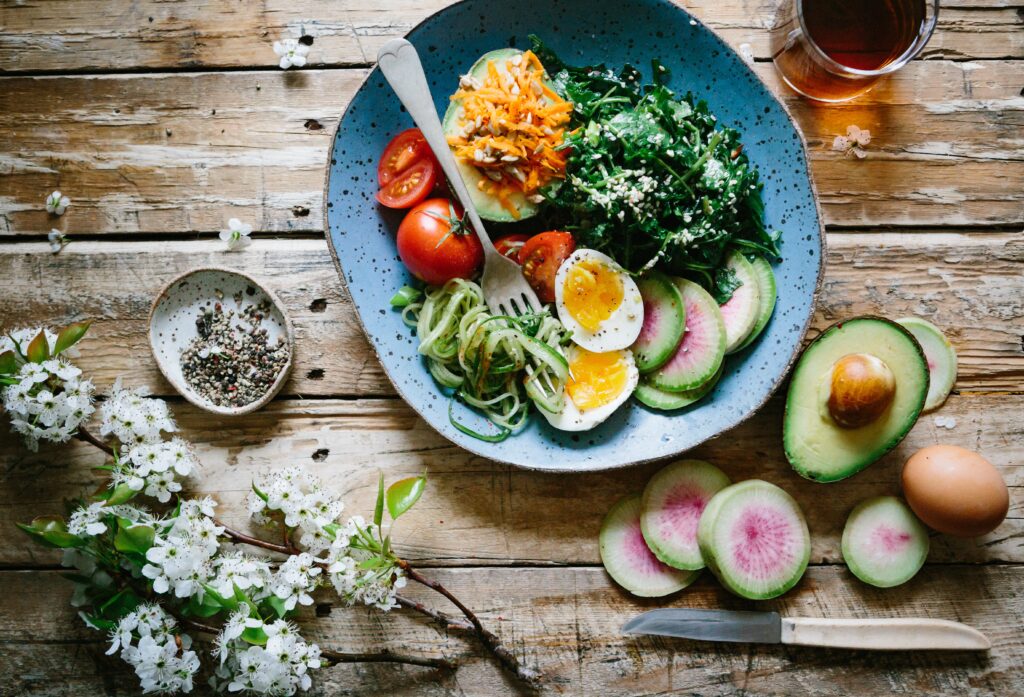
Anti-inflammatory foods:
Now I’m sure you’ve heard us talk about these foods before, but they’re just so important! Anti-inflammatory foods are key to helping us manage and treat conditions such as Adenomyosis. These foods can have a similar effect on pain relief when compared to the use of NSAIDs (non-steroidal anti-inflammatory drugs – a common example is ibuprofen).
In fact, a study in 2014 by Shirvani et al showed that ginger was just as effective as mefenamic acid (a type of NSAID) for pain relief when it comes to painful periods.
Some foods to include in your diet for adenomyosis to help lower inflammation can include:
- Turmeric (add it to soups, curries, sprinkled on roasted veggies, scrambled into eggs, or added raw in juices!)
- Rosemary (read more here)
- Grapes – rich in the antioxidant resveratrol
- Extra virgin olive oil (EVOO) rich in antioxidants and vitamin E.
- Dark chocolate for its polyphenol content, but too much can lead to excess sugar and dietary saturated fats
- Capsicums or bell peppers for their vitamin C content
- Broccoli & other cruciferous vegetables like cauliflower, bok choy, kale & cabbage
A few favourites from our antioxidant list that would an excellent choice when eating to reduce inflammation are; oily fish, dried herbs & spices and green tea.
Want to dive deeper into Anti-inflammatory Foods and Nutrition?
Want Scientifically Proven Nutrition and Lifestyle Strategies to Combat Endo Pain and Symptoms?
Regain Control of Your Life and Flourish Again with our 1-hour Masterclass! Only $75UAUD!
Includes eGuide and 7-day meal plan!
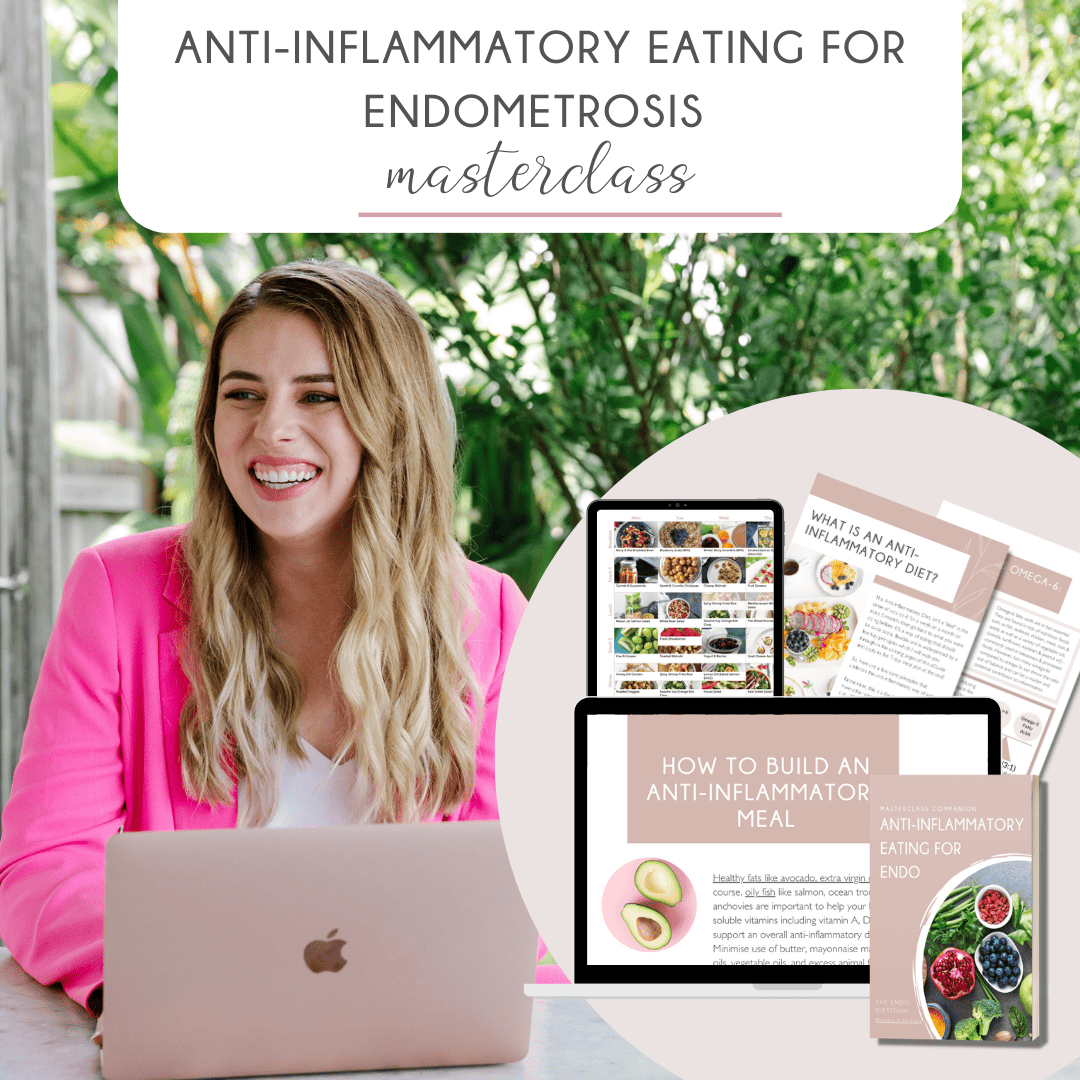
What about estrogen?
What does estrogen do when it comes to adenomyosis?
As we touched on in the podcast, we know adenomyosis, much like endometriosis, is an estrogen-linked disease. Meaning those who have higher levels of estrogen circulating in their body are at higher risk of developing the condition with a decreased ability to manage symptoms (Kitawaki, 2006).
Take a look at our tips and recommended foods for lowering estrogen here.

Immune Health, Diet and Adenomyosis
Why is immune health relevant when it comes to managing adenomyosis?
As we currently know from the research to date, adenomyosis occurs as a result, partially due to changes of the immune functions within the uterus. This is associated with the development of the disease and its persistence (Bourdon et al., 2021). From what we understand, it is likely that these immune changes stimulate the migration of endometrial cells into the myometrium (middle muscle layer of the uterus) and along with that inflammation, promotes the inflammatory process.
Therefore, we want to ensure we are fuelling our body to support and regulate our immune function. We talk more about in this blog post. Some nutrients to include to support this would be:
- Omega 3 fatty acids (think oily fish, flaxseeds, chia seeds & walnuts – these can help support an anti-inflammatory response)
- Vitamin E (extra virgin olive oil, olives, almonds, peanuts or spinach)
- Vitamin C (citrus fruits, peppers, broccoli, potatoes)
- Selenium (yoghurt, brazil nuts)
- Carotenoids (carrots, papaya, pumpkin, sweet potato)
- Zinc (oysters, shellfish, fish, poultry, red meat, legumes & beans, cashews & pumpkin seeds)

What foods to avoid for adenomyosis – gluten, dairy, sugar, alcohol?
I’m sure you’re wondering about what foods to avoid for adenomyosis. Let me just say, there are a few myths out there! Right now, there just isn’t enough research to definitively say what foods to avoid for adenomyosis. So, anyone telling you to cut out fruit, gluten or dairy from your diet hailing it as a miracle cure really needs to be challenged.
Excluding major food groups from your diet can significantly increase your risk for nutrient deficiencies, and may not be all that effective when it comes to symptom management anyway.
However, what we do know, is that excess sugar and alcohol can certainly lead to increased inflammation and disease (Freeman et al., 2018)(Wang et al., 2010). Therefore, it’s safe to say, only consume these in moderation.
Overall, there is a significant lack of research about nutrition and adenomyosis to date, so applying many of the principles that we know about endometriosis can be helpful including anti-inflammatory eating principles and supporting a healthy immune system. However, no single diet or dietary strategy is a cure for adenomyosis.
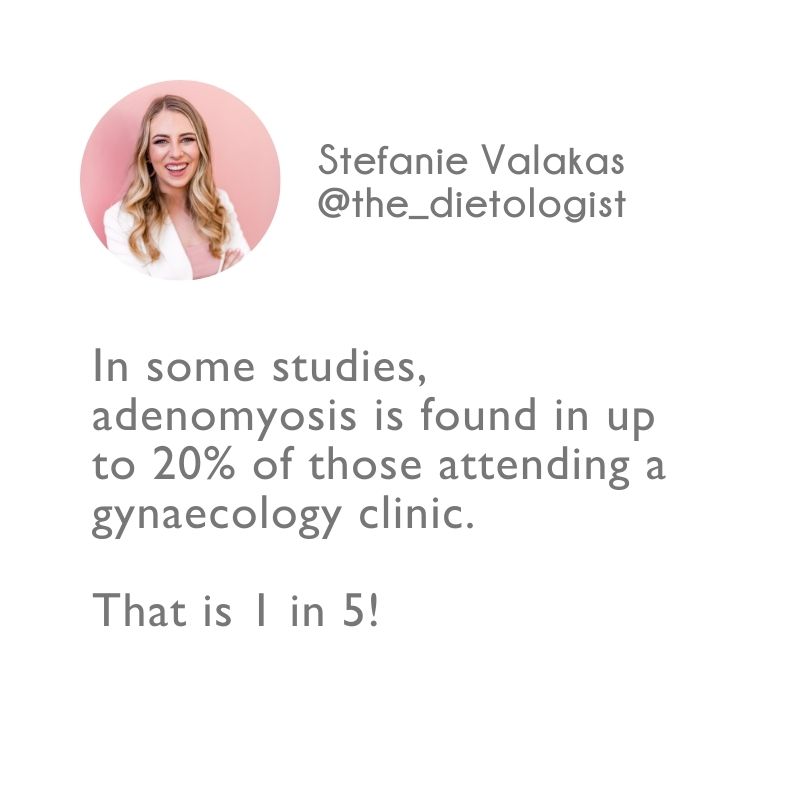
Looking for personalised nutrition support for your adenomyosis symptom management? The expert dietitians at The Dietologist are here to help with one-on-one online consultations available worldwide, Apply to work with us today, for a tailored plan for your lifestyle and needs!


